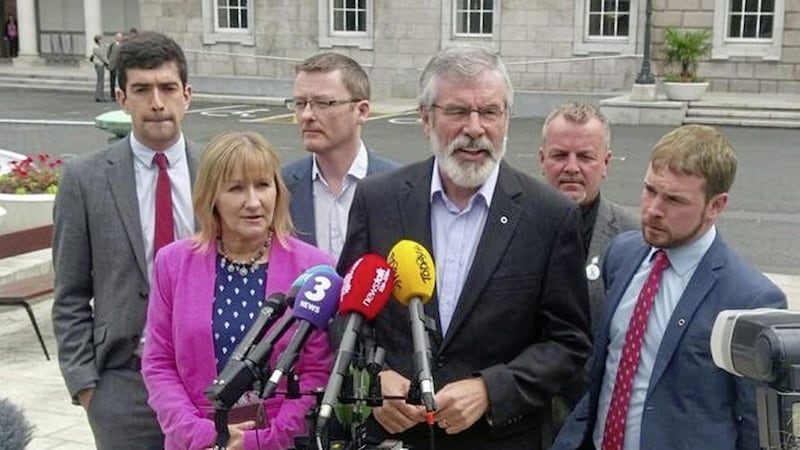Nationalism has responded to the prospect of DUP-Tory rule by raising two points.
The first is how can the British government exercise “rigorous impartiality on behalf of all the people”, as required by the Good Friday Agreement.
The second, how can secretary of state James Brokenshire be independent as he chairs Stormont talks?
These are valid questions. However, as objections, they were worn out long ago.
Sinn Féin has been demanding a new chair at Stormont since March, when the talks began. In April, the party signalled it would not attend any plenary sessions where James Brokenshire was present, because the British government was not neutral on legacy issues.
That same month, just after the general election was called, Sinn Féin national chair Declan Kearney wrote an article in An Phoblacht claiming the DUP’s “Westminster command” was steering British government policy and this “dovetailed” with the decision to hold an election as a “right-wing power-grab.”
Kearney compared this nightmarish prospect to the collapse of the 1996 IRA ceasefire. Yet now it has actually happened, Gerry Adams is laughing the whole thing off as “minimal”, “transitory” and bound to end in unionist tears.
As for the lack of British impartiality in Ireland, that goes rather further back in republican thinking - to at least 1798, since when it has been decried in speech and statement as the font of all evil.
For example, at a Newry election rally this February, Adams roused the crowd by saying: “The British government is not neutral. It was never neutral. It is a partisan participant which always backs the unionist position.”
Whether a Tory-DUP deal breaches the agreement is a matter of legal debate. Prime ministers Theresa May and David Cameron managed to proclaim themselves “never neutral” on the union without bringing the house down - but a Westminster pact goes beyond that and the matter deserves a proper legal answer.
However, late last year, Sinn Féin and the SDLP were party to a judicial review and an appeal to the UK Supreme Court, the highest court in the land, where the judges unanimously found Brexit does not affect one word of the Good Friday Agreement. Rather than accept and welcome this verdict - supposedly the answer they wanted to hear - nationalists just kept on complaining about the imminent end of the peace process.
Now the hysteria has started again, I find myself recalling the words of Sinn Féin’s John O’Dowd when the UUP once complained about something or other.
“So what?” he said.
Of course, O’Dowd went to school in Lurgan.
A more erudite recollection would be the words of King Lear: “I will do such things... what they are, yet I know not: but they shall be the terrors of the earth.”
What might those things be?
Pulling down the executive? Demanding a border poll? Triggering an election? All the moves have already been played. No doubt some other destabilising stunt could be devised but after six months of Operation Chaos, the law of diminishing returns has kicked in and even kicked back, with unionism regaining its mojo if not its majority.
No unionist should note this with triumphalism and personally I note it with weariness. The pendulum has swung to and fro once again, to no particular avail whatsoever - the DUP went too far with Fresh Start, then Sinn Féin went too far collapsing Stormont.
There are signs they recognise this. The DUP had been showing some humility, relatively speaking, although it is struggling not to gloat about its Westminster coup.
Sinn Féin has been toning down the rhetoric since the election, and not just on the Tory-DUP relationship. On Saturday, Adams said a border poll was still inevitable, but only in the sense it will happen in its own good time. On Monday, Sinn Féin said the Stormont parties can nominate their own talks chair, which would spare London the awkwardness of conceding its own impartiality.
When he pulled the plug on Stormont in January, Adams warned supporters: “there are more unionists than republicans.”
It was tempting to test if Brexit might turn the former into the latter but that was always unlikely and has now been disproved at the polls.
Northern Ireland is not going to run out of time before its time. Until then, no permanent ‘win’ is possible and any attempt to push the pendulum too far will just swing it back in your face.
We may hope Adams is learning that lesson - and Foster is not unlearning it.
newton@irishnews.com









